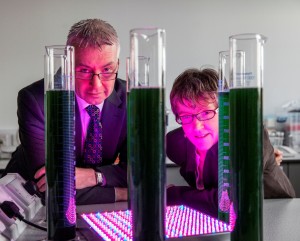UNIVERSITY RESEARCHERS EMBARK ON £1.1M BIOFUEL PROJECT
UNIVERSITY RESEARCHERS EMBARK ON £1.1M BIOFUEL PROJECT
Researchers at two leading Scottish universities have embarked on a £1.1m project to find a clean and effective way of producing biofuel using solar energy.
Robert Gordon University (RGU) experts Professor Linda Lawton and Professor Peter Robertson, alongside University of St Andrews Professor John Irvine, have been awarded funding of £1,153,133 by the Engineering and Physical Sciences Research Council (EPSRC) to investigate photocatalytic bioethanol production.

The four year project will see the trio, who specialise in microbiology, engineering and chemistry respectively, aim to design a cost effective, environmentally friendly approach to producing bioethanol from agricultural, forestry or industrial waste products by utilising solar energy.
Rather than use up food crops such as sugar cane, the approach harnesses the substantial quantities of fibrous waste available within the UK such as straw or recovered paper, which consists largely of cellulose. Sugar molecules are contained within the cellulose but are bound within a complex structure and require to be released before they can be fermented and turned into ethanol.
Prof. Lawton, who is a member of RGU’s Innovation, Design and Sustainability (IDEAS) research institute alongside Prof. Robertson, explained: “Previous attempts to harness cellulosic waste have used extreme treatment conditions to release the usable sugars, with enzymes, acid and alkali explosion, wet oxidation and steam explosion being combined with high pressures and temperatures. These procedures are expensive, energy demanding and generate hazardous waste.
“What we are proposing is the production of bioethanol from cellulosic waste using photocatalysis combined with the fermentation process in a single reactor. Photocatalysis – the use of a catalyst to accelerate a photoreaction by generating free radicals – will be used to release sugars from the cellulose which will then pass through a semi-permeable membrane before being fermented to yield bioethanol.”
It is an approach which has multiple advantages, according to the research team, using a catalyst which is low cost, non-toxic, self-cleaning, recoverable and activated by harvested natural light.
Key components of the research programme include the targeted design and synthesis of novel catalysts to achieve the maximum quantity of fermentable sugars; the screening of microbes for maximum production of bioethanol; and the design, fabrication, testing and optimisation of a reactor in which the entire process will take place.
Prof. Robertson said: “One of the greatest challenges in the 21st century is to meet the global energy demand, with an increasing focus on renewable energy sources. Biofuel production involving food crops such as sugar cane and corn has been criticised due to a rapidly increasing population, food prices and the necessity of deforestation for their cultivation, so there is an urgent need to develop more sustainable alternatives that do not impact on global food production.
“This is about taking something that is a waste product and converting it into something that we can utilise – that is sustainability at its best. It is a privilege to have received this funding which will help us to transform our ideas into reality.”
The project is part of the EPSRC’s SUPERGEN Bioenergy programme, which aims to bring together industry, academia and other stakeholders to focus on the research and knowledge challenges associated with increasing the contribution of UK bioenergy towards environmental targets.
